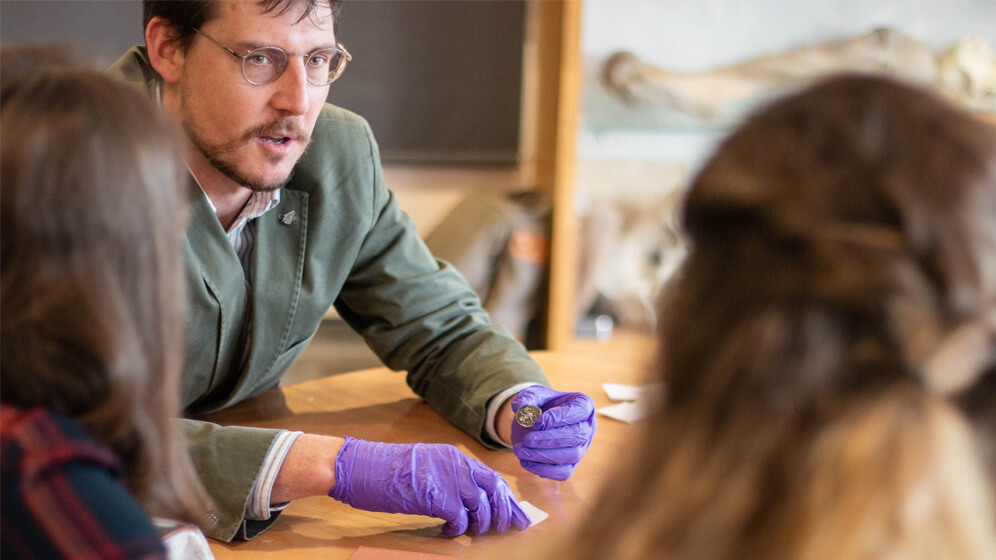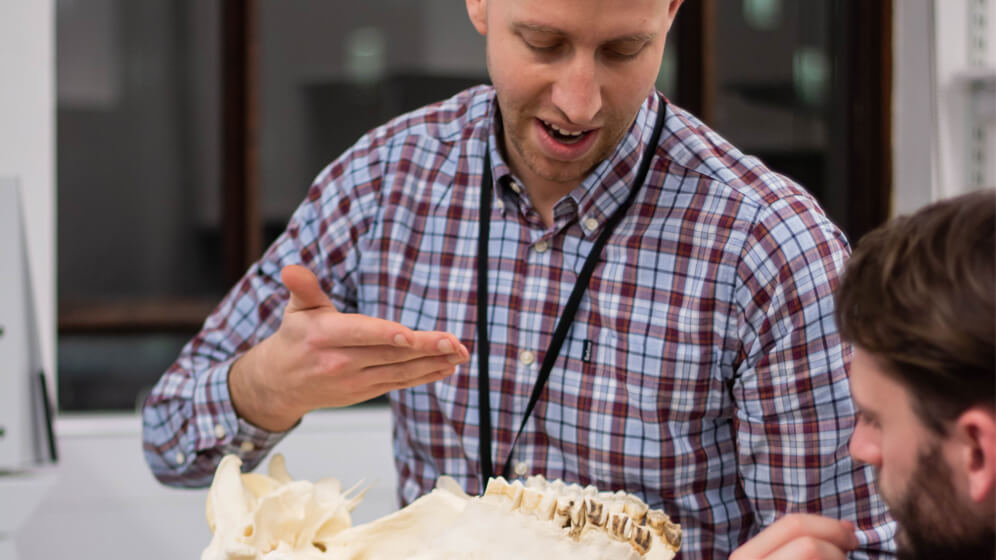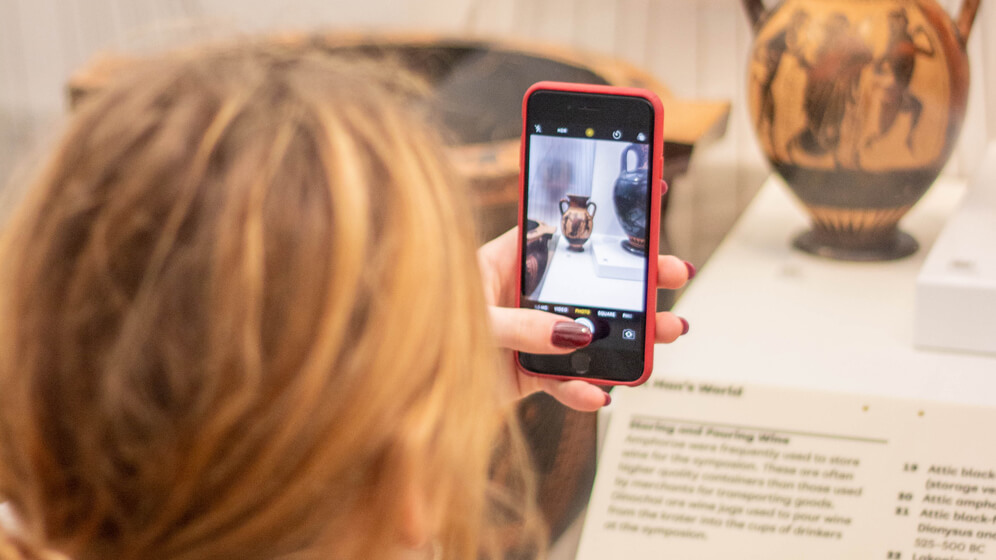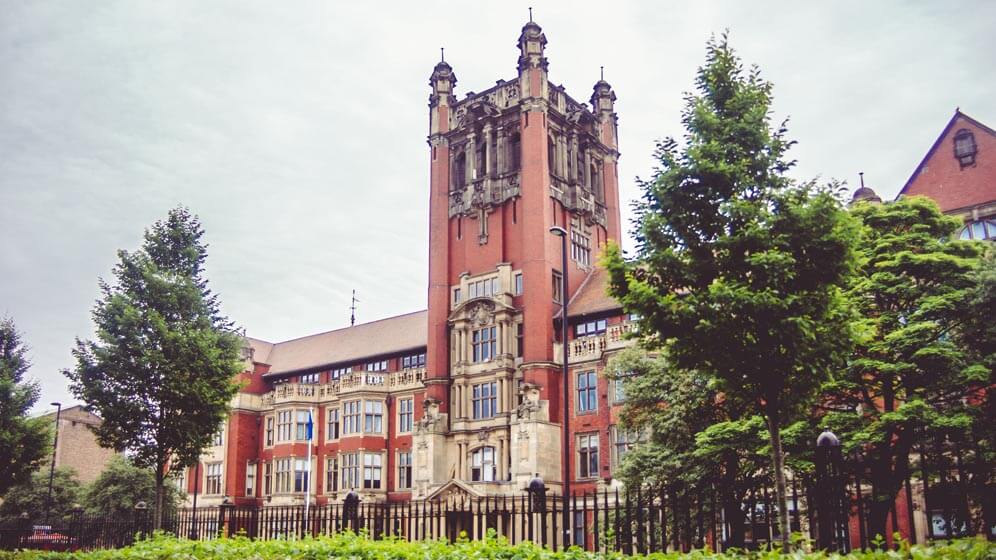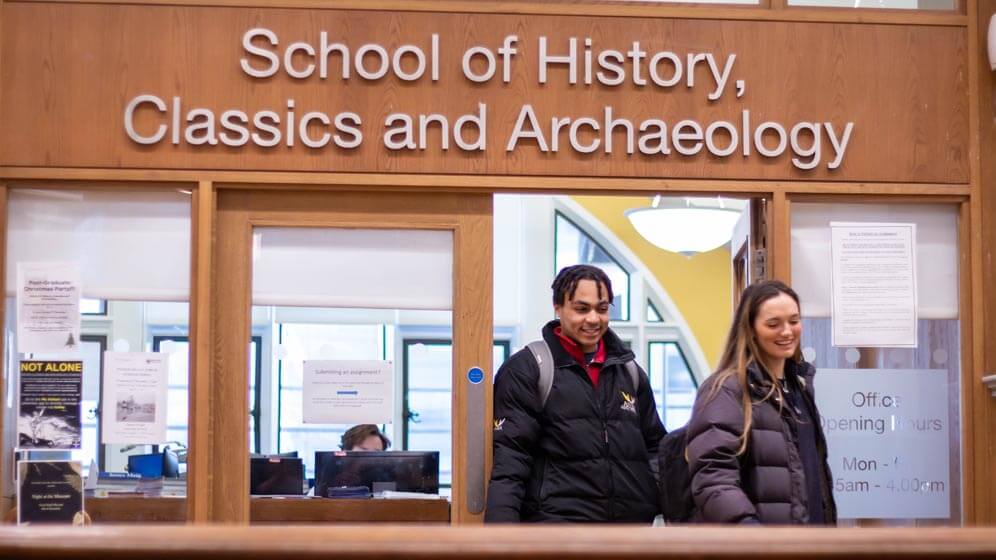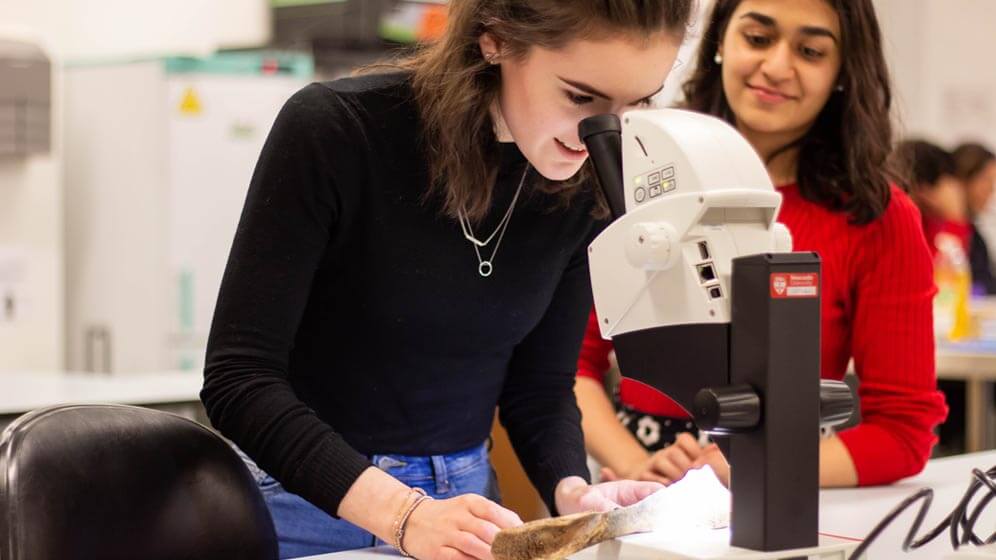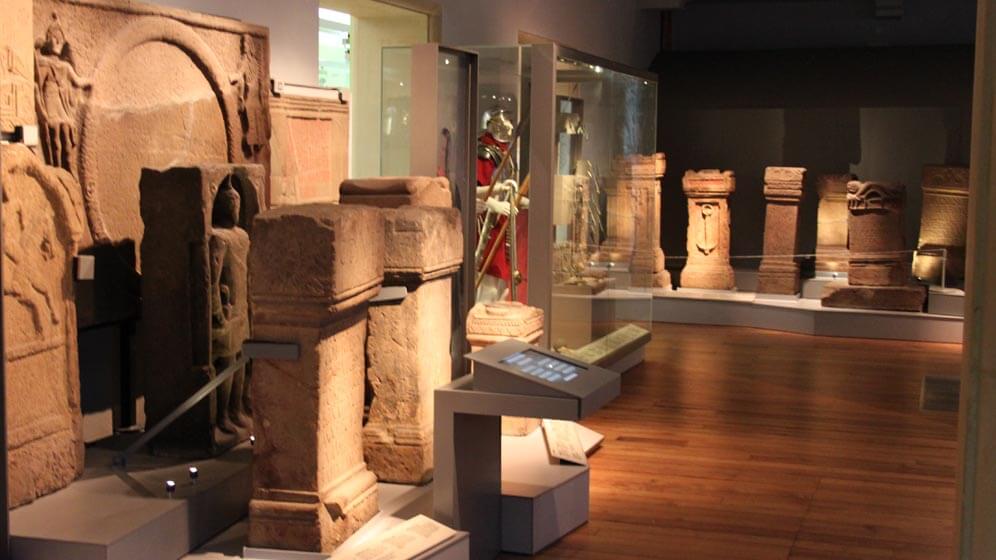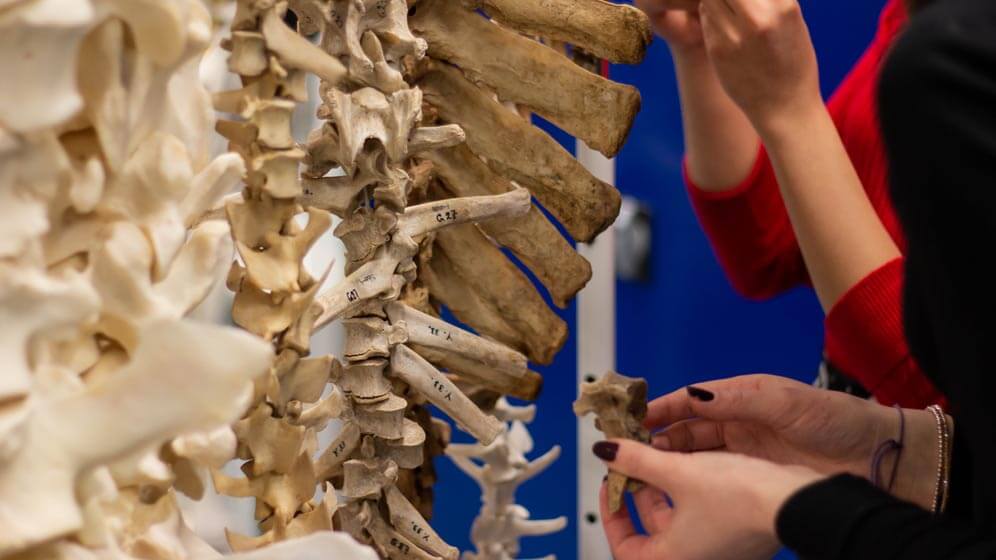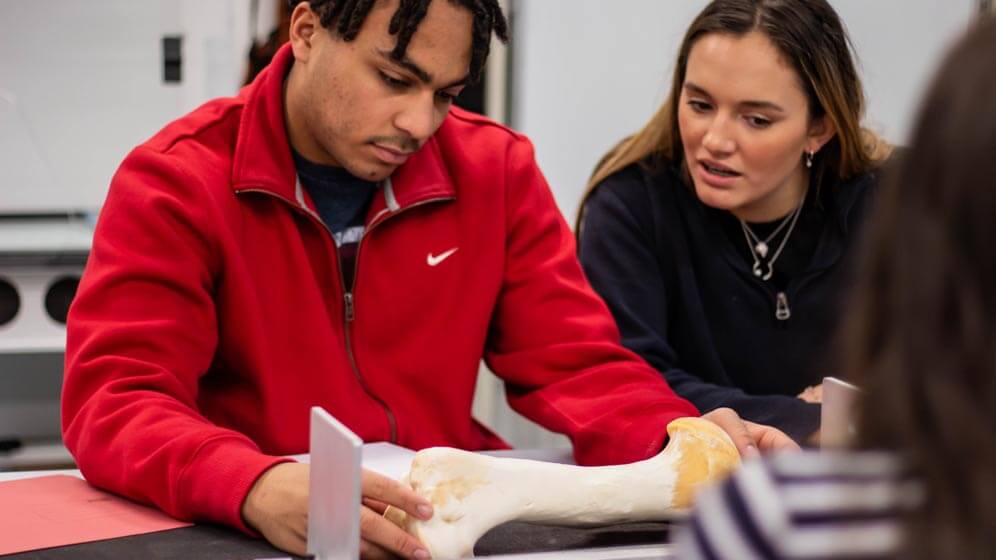Ancient History and Archaeology BA Honours
- UCAS code: VV14
- Full time
- 3 years
Uncover the history, culture and philosophies of the ancient world and engage with the material remains of these societies.
You are currently viewing course information for entry year: 2026
Next start date:
- September 2026
UCAS Institution name and code:
- NEWC / N21
Course overview
Our Ancient History and Archaeology BA (Honours) degree is accredited by the Chartered Institute for Archaeology (CIfA) and University Archaeology UK (UAUK).
Immerse yourself in ancient history and archaeology on our joint honours degree. With the opportunity to learn Latin and Ancient Greek from beginners' or intermediate level, and gain the skills you’ll need for your future career.
Explore the global ancient world, including the classical civilisations of Greece and Rome, and piece together their history using diverse types of evidence. From analysing ancient texts to studying material remains, you’ll explore areas such as architecture, sculpture, pottery and coins ensuring you develop a broad range of knowledge.
Our classroom extends beyond the University, to the region's diverse heritage, based in an area of world class archaeology on the edge of the Roman Empire. From Hadrian's Wall to Bamburgh Castle on the Northumbrian coast, there's a rich past to discover on our doorstep.
Your course and study experience - disclaimers and terms and conditions
Please rest assured we make all reasonable efforts to provide you with the programmes, services and facilities described. However, it may be necessary to make changes due to significant disruption, for example in response to Covid-19.
View our Academic experience page, which gives information about your Newcastle University study experience for the academic year 2025-26.
See our terms and conditions and student complaints information, which gives details of circumstances that may lead to changes to programmes, modules or University services.
Quality and ranking
Professional accreditation and recognition
All professional accreditations are reviewed regularly by their professional body.
Modules and learning
Modules
The information below is intended to provide an example of what you will study.
Most degrees are divided into stages. Each stage lasts for one academic year, and you'll complete modules totalling 120 credits by the end of each stage.
Our teaching is informed by research. Course content may change periodically to reflect developments in the discipline, the requirements of external bodies and partners, and student feedback.
Optional module availability
Student demand for optional modules may affect availability.
Full details of the modules on offer will be published through the Programme Regulations and Specifications ahead of each academic year. This usually happens in May.
To find out more please see our terms and conditions
You will receive the same introduction to archaeology as our single honours students, but focus on classical art and archaeology. Choose from Ancient History and Classics options, like Greek Literature, Ancient Philosophy or Roman History and Culture.
In the summer, you will complete two weeks of funded fieldwork.
Modules
| Compulsory Modules | Credits |
|---|---|
| Introduction to Archaeology | 20 |
| The Archaeology of Britain from the Romans to the 20th Century | 20 |
| Greek and Roman Art and Archaeology | 20 |
You'll enhance your core skills as an archaeologist and ancient historian through our compulsory modules on Fieldwork skills and the Archaeology of the Roman world - where we'll introduce you to the landscapes, buildings, and artefacts of this diverse Empire.
Your remaining modules will focus on a range of different aspects of the ancient world, such as slavery or religion.
Modules
| Compulsory Modules | Credits |
|---|---|
| Fieldwork and Post-Excavation: Archaeology in the UK | 20 |
| Archaeologies of the Roman Empire: The Roman World from Augustus to Justinian | 20 |
Your final year allows you to follow options that interest you most, whether that's Early Medieval Britain or Roman Egypt. You'll complete a dissertation on your topic of choice under the supervision of an expert member of staff.
Modules
Compulsory modules
Modules
We base these figures and graphs on the most up-to-date information available to us. They are based on the modules chosen by our students in 2024-25.
Teaching time is made up of:
- scheduled learning and teaching activities. These are timetabled activities with a member of staff present.
- structured guided learning. These are activities developed by staff to support engagement with module learning. Students or groups of students undertake these activities without direct staff participation or supervision
Teaching and assessment
Teaching methods
You'll learn from:
- lectures
- seminars
- tutorials
- workshops
- practical activities
- site visits and fieldwork training
- independent study
Assessment methods
You'll be assessed through a combination of:
-
Assessments
-
Assignments – written or fieldwork
-
Coursework
-
Dissertation or research project
-
Dossier
-
Essays
-
Examinations – practical or online
-
Group work
-
Portfolio submission
-
Practical sessions
-
Presentations
-
Projects
-
Reports
-
Seminar tasks/exercises
Skills and experience
Practical skills
Practical experience forms a key part of this investigative and interdisciplinary degree. You'll gain hands-on experience handling artefacts from our on-campus Great North Museum.
You'll gain excavation experience at our Stage One field school, with further fieldwork opportunities elsewhere in the UK or abroad.
Research skills
In your final year, you'll write a dissertation on a topic of your choosing, using skills you have developed during your degree. You'll hone your investigative skills, undertaking independent research, with access to extensive resources, archives and special collections.
Opportunities
Study abroad
Experience life in another country by choosing to study abroad as part of your degree. You’ll be encouraged to embrace fun and challenging experiences, make connections with new communities and graduate as a globally aware professional, ready for your future.
You'll have the opportunity to study abroad for a full year after Stage Two. You can study in an EU country as part of a study abroad exchange or further afield. You’ll then return to Newcastle to complete your degree.
In Europe we currently have links with:
- Cité Internationale Universitaire de Paris, France
- Universidad Carlos III de Madrid, Spain
- Leiden University, Netherlands
- Charles University Prague, Czech Republic
- University of Ljubljana, Slovenia
- Södertörn University, Sweden
- University of Turku, Finland
Find out more about study abroad.
Work placement
Apply your practical skills, increase your confidence and gain real-life work experience to accelerate your career. Take a 9-12-month industrial placement in the UK or abroad. Work placements usually take place in stage 3 of your studies and extend your degree by one year.
Facilities and environment
Facilities
You'll be based in the School of History, Classics and Archaeology, located at the heart of campus in the historic Armstrong Building. You'll have access to excellent study resources including:
- the Philip Robinson University Library, which houses over 800,000 books and provides access to ca. 1.8m e-books
- Special Collections & Archives – a rich collection of archival material, historical medical texts and rare books
- The Great North Museum: Hancock, our on-campus museum which holds an extensive collection of Greek, Roman, and Etruscan artefacts.
-
The Wolfson Archaeology Laboratory - with facilities for use-wear analysis of bone, stone, metal and glass, and furnaces for research in material culture or experimental archaeology.
- a Material Culture Analytical Suite kitted out with microscopes, and 2D and 3D scanning equipment.
Find out more about the School of History, Classics and Archaeology
Support
You'll have the support of a lecturer as a personal tutor throughout your degree, and a student mentor will help you settle in.
This is a subject for everyone: we teach you all you need to know, and support your progress through to the end of the degree.
Peer mentors will help you in your first year. They are fellow students who can help you settle in and answer any questions you have when starting university.
Your future
Our Ancient History and Archaeology degree will set you up to start a career as a professional archaeologist or to pursue a future in museum and heritage work, as well as a whole range of other careers.
As an archaeology and Ancient History student at Newcastle University, you'll develop a wide range of transferable skills, due to the interdisciplinary and investigative nature of the subject, which are highly sought by employers.
Our graduates can use their team-working, project management and analytical skills to work in a broad spectrum of fields, for example as company archivists, information technologists, specialist librarians and researchers. These skills are especially valued in industries such as publishing, broadcasting and public relations. Some students become teachers, lawyers, or start their own businesses.
Read more about our graduate paths
Follow in their footsteps

- Name: George
- Nationality: British
- Graduated: 2018
- Now working as: Civil Servant – Programmes Lead, National Crime Agency
"Archaeology is a highly sought after qualification because archaeologists have to work with such a range of material to form an argument. I have no doubt that the skills I developed at BA and MA will continue to be key to my career development."
Find out what George liked the most about studying Ancient History and Archaeology at Newcastle University and how this degree helped him in his career.
Sorry, you need JavaScript to view this video
Careers support
Work placements are available as part of your degree, and there are many volunteering opportunities to enhance your CV.
Students in their second year can apply for funding to support their own research projects over the summer break.
Our Careers Service is one of the largest and best in the country, and we have strong links with employers. We provide an extensive range of opportunities to all students through our ncl+ initiative.
Visit our Careers Service website
Recognition of professional qualifications outside of the UK
If you’re studying an accredited degree and thinking about working in Europe after you graduate, the best place to find current information is the UK Government’s guidance on recognition of UK professional qualifications in EU member states. This official resource explains whether your profession is regulated in another country, what steps you need to take, and which organisation you should contact.
Entry requirements
All candidates are considered on an individual basis and we accept a broad range of qualifications.
The entrance requirements and offers below apply to 2026 entry.
| A-Level | |
|---|---|
| International Baccalaureate | |
|---|---|
Other UK and the Republic of Ireland qualifications
Alternative offers at Newcastle
Through one of our contextual or alternative offer routes, you could receive an offer of up to three grades lower than the typical requirements.
Contextual offers
We use certain contextual data from your UCAS form, alongside your application, to consider challenges that you may have faced in your education and the potential effect this may have had on your qualifications. This means you may be eligible to receive a lower contextual offer.
PARTNERS offers
One of the largest and longest support entry routes to university of its kind for students from underrepresented backgrounds. We support applicants from application through to study.
Realising Opportunities offers
A unique programme delivered in collaboration with 10 leading, research-intensive universities in the UK. The programme is open to students in Year 12/first year of college.
Pathways to Newcastle offers
Pathways to Newcastle, our national skills entry route, is available for specific subject areas.
High Performance Athletes
We support promising athletes at the application stage, who compete in regional, national or international levels in their sport.
Qualifications from outside the UK
English Language requirements
Entrance courses (INTO)
International Pathway courses are specialist programmes designed for international students who want to study in the UK. We provide a range of study options for international students in partnership with INTO.
These courses are specifically designed for international students who want to study in the UK and progress onto one of our undergraduate degrees. Our International Study Centre, has a range of study options including:
- International Foundation
- International Year One
- English Language courses
Find out more about International Pathway courses
Admissions policy
This policy applies to all undergraduate and postgraduate admissions at Newcastle University. It is intended to provide information about our admissions policies and procedures to applicants and potential applicants, to their advisors and family members, and to staff of the University.
University Admissions Policy and related policies and procedures
Credit transfer and Recognition of Prior Learning
Recognition of Prior Learning (RPL) can allow you to convert existing relevant university-level knowledge, skills and experience into credits towards a qualification. Find out more about the RPL policy which may apply to this course.
Tuition fees and scholarships
Tuition fees for academic year 2026-2027
The 2026 entry home fees have not yet been confirmed.
| Qualification: BA Honours | |
|---|---|
|
Home students full time 3 years |
Tuition fees (Year 1)
Not set |
|
International students full time 3 years |
Tuition fees (Year 1)
25,000 |
Year abroad and additional costs
For programmes where you can spend a year on a work placement or studying abroad, you will receive a significant fee reduction for that year.
Some of our degrees involve additional costs which are not covered by your tuition fees.
Scholarships
Find out more about:
Open days and events
You'll have a number of opportunities to meet us throughout the year at our on-campus and virtual open days.
You'll be able to:
- explore our beautiful campus
- find out about our vibrant city
- discover what students think about studying at Newcastle
You'll also have the opportunity to speak to academic staff and find out more about the subjects you're interested in.
Find out about how you can visit Newcastle in person and virtually.
We regularly travel overseas to meet with students interested in studying at Newcastle University. Visit our events calendar to find out when we're visiting your region.
How to apply
Apply through UCAS
To apply for undergraduate study at Newcastle University, you must use the online application system managed by the Universities and Colleges Admissions Service (UCAS). All UK schools and colleges, and a small number of EU and international establishments, are registered with UCAS. You will need:
- the UCAS name and institution codes for Newcastle University (NEWC/N21)
- the UCAS code for the course you want to apply for
- the UCAS 'buzzword' for your school or college
If you are applying independently, or are applying from a school or college which is not registered to manage applications, you will still use the Apply system. You will not need a buzzword.
Apply through UCASApply through an agent
International students often apply to us through an agent. Have a look at our recommended agents and get in touch with them.
Get in touch
By phone
Call us on +44 (0) 191 208 3333 and press option 1. Our opening hours are Monday to Friday 10am until 4pm.
Live chat
Our NCL chatbot might be able to give you an answer straight away. If not, it’ll direct you to someone who can help.
You'll find our NCL chatbot in the bottom right of this page.
Online
Chat to our students
Choosing a university is a big decision. If you've got questions about a particular course, student life or the city of Newcastle, why not chat to our friendly students or graduates!
Keep updated
We regularly send email updates and extra information about the University.
Receive regular updates by email